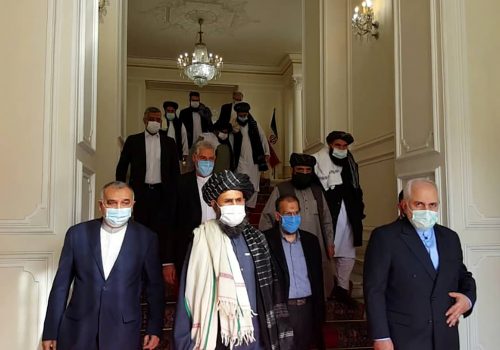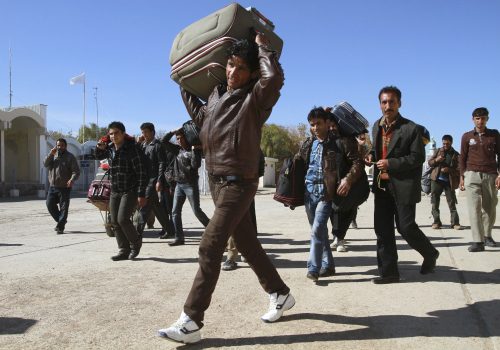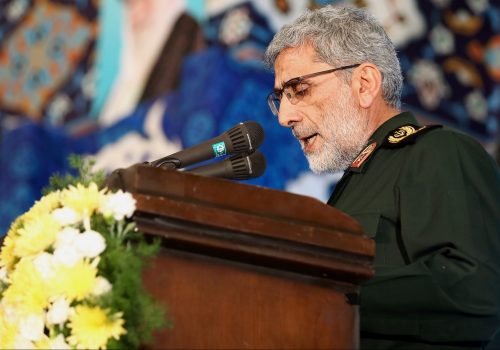Iran spent years preparing for a Taliban victory. It may still get stung.
The United States and other western nations frantically evacuated their embassies in Kabul for fear of the Taliban’s vengeance. But Iran was sitting pretty and staying put. Iran’s embassy in Kabul, as well as its consulate in Taliban-controlled Herat, remained “fully open and operational,” said Saeed Khatibzadeh, spokesperson of the Ministry of Foreign Affairs, on August 16.
Iran’s relatively sanguine stance toward the Taliban’s takeover of Afghanistan demonstrates, above all, the strides Tehran has made in improving its relations with the armed insurgent network that was once considered a mortal enemy of the Islamic Republic.
Twenty-three years ago, the Taliban murdered eleven diplomats and a journalist at Tehran’s mission in Mazar-i-Sharaf, nearly sparking a war between the two countries. In the intervening years (especially in the last decade), some security factions in Iran have warmed to the Taliban, even as other voices have strenuously objected to any rapprochement with the group. Iran’s outgoing Foreign Minister, Mohammad Javad Zarif, recently hosted the Taliban in Tehran for a meeting with envoys of the US-backed Kabul government, while the country’s new President Ebrahim Raisi called the US withdrawal “an opportunity to restore life, security, and lasting peace in that country.”
“The Taliban has an overly negative image in Iran,” said Mohammad Javad Mousavizadeh, an analyst and researcher in Tehran. “Even recent talks between Iranian officials and the Taliban have [been] met with an adverse public reaction.”
In recent days, Iranian authorities reportedly advised media outlets to tone down any criticism of the Taliban and avoid using terms like “brutality, crime, atrocity” when referring to the group, which is also widely despised in Iran for its genocidal campaign against mostly Shia Afghan Hazaras during the period of its rise and rule from the mid-1990’s to 2001.
“The surprising development that we’re seeing is that we’ve heard multiple voices in state media arguing that the Taliban are not seeking genocide against Shia,” said Adnan Tabatabai, an Iran watcher and CEO of the Center for Applied Research in Partnership with the Orient. “The Iranian security apparatus realized that there is a powerful force on the ground. Iran sought its relationship to the group and shoved aside any other ideological or religious consideration.”
The controversial recasting of the group has likely been promoted by powerful figures within the Islamic Revolutionary Guard Corps (IRGC). The commander of the IRGC’s overseas expeditionary Quds Force, Ismail Qaani, is regarded as a veteran Afghanistan player and a purported recruiter of Hazara fighters to Syria. Both US and Afghan officials have accused Iran of collaborating with the Taliban for years.
The effort to reshape Iranian views of the Taliban has accelerated since their takeover of the country. The prominent Iranian Sunni cleric Molavi Abdolhamid Ismael-Zahi, a supporter of the Iranian regime based in the eastern border city of Zahedan, praised the Taliban’s “great victory” over “the occupiers of the puppet government” in Kabul.
“I assure the world that the Taliban of today are not the Taliban of twenty years ago,” he was quoted as saying by the news outlet Sunni Online. “They have learned and changed their views. Their faults can be amended. We know the Taliban better than many other people in the world because we are their neighbors.”
Meanwhile, the outspoken former President Mahmoud Ahmadinejad claimed in a video that he was urged by authorities to keep his mouth shut after warning of the dangers the Taliban posed to Iran. “What relationship do you have with the Taliban…that when we say something about them you get upset?” Ahmadinejad said in a video. “When I see a grave threat to the country, why should I be quiet?”
But it has not been just Iran reaching out to the Taliban to widen its contacts and influence in Afghanistan. The current version of the Taliban has also sought to accommodate Iran to expand the group’s portfolio of diplomatic support beyond Pakistan.
Last year, the Taliban made a big show of appointing a Shia cleric from the Hazara community as a district governor in northern Afghanistan. The Taliban have regularly condemned attacks on Shia mosques and districts of Afghanistan, presumably being carried out by the local branch of the Islamic State of Iraq and al-Sham (ISIS), which is hostile to both Iran and the Taliban. Most recently, the Taliban came out forcefully to deny any link to a horrific attack on a girls’ school in a mostly Shia district of western Kabul. The group also allowed Shias to commemorate Ashura, a holy holiday, in Mazar-i-Sharaf.
Many Iranian voices are still skeptical, viewing such conciliatory gestures and maneuvers by the Taliban as ploys to convince Afghans they are inclusive while they sought to erode the legitimacy of the Kabul government and assure hesitant international stakeholders. Now that they are in control and once the evacuations of western personnel from Afghanistan has concluded, the real Taliban will emerge, goes the thinking.
“There’s a debate inside Iran and some are pushing back against this notion that the Taliban have changed,” said Tabatabai. “There are those who are saying the Taliban leaders are saying one thing while the others are just waiting for their moment.”
However, there are also incentives for the Taliban to be on their best behavior and not risk alienating the Islamic Republic. Tehran’s support for the Northern Alliance of anti-Taliban forces and discreet backing of the 2001 US-led NATO invasion played a key role in the toppling of the Taliban, and the group’s leaders likely know it.
As far as Afghanistan’s new Taliban overlords are concerned, conflict with Iran is bad for business. Iran and Afghanistan share a 570-mile border that includes several lucrative trade routes and is a major transit point for the trafficking of opium—a resource the Taliban has depended on to fund itself. Beyond their sectarian differences, both Iran and the Taliban share an antipathy toward the United States and the west in general.
For Iran, the benefits of good relations with the new Taliban are less obvious. Perhaps Tehran can see a silver lining in an autocratic theocracy overseeing Afghanistan rather than a messy, freewheeling democracy close to Washington. But it also had excellent contacts and significant influence with the Kabul governments of Hamid Karzai and Ashraf Ghani. Iran’s emerging status as a Taliban interlocutor has won it some diplomatic influence, including from India, which has sought to reach out to Tehran as a channel to the Taliban.
Nevertheless, even a kinder, gentler version of the Taliban poses far more risks to Iran than potential rewards. Hundreds of thousands of Afghans fearful of the Taliban’s harsh, fundamentalist interpretation of Islam are already heading to Iran to escape their country, if only to find a better life for women and girls. That could put pressure on a Tehran government already under heavy US sanctions that have yet to be lifted.
Millions of Afghans living in Iran for decades have already become a more outspoken presence. Afghans in cities like Qom have begun holding protests against the Taliban, chanting “death to the Taliban” and “death to Pakistan.” Iranians across the political spectrum view the Taliban with disgust.
“It is clear to Iranian officials what the nature of the Taliban is,” said Mousavizadeh. “the nature of the Taliban is no different from that of the 1990’s. However, the Taliban have gained experience over the past two decades that has rationalized their behavior, to not repeat the tragedies and crimes of the past.”
There are a few indications that Iran is hedging its bets on the group despite its superficial welcoming of the Taliban’s victory. Even as Iranian officials boasted that the embassy in Kabul and consulate in Herat would remain open, the foreign ministry revealed on August 15 that it quietly shuttered missions in Jalalabad, Kandahar and, of course, Mazar-e Sharif, where the Taliban murdered Iranian personnel.
Iran may not want to alienate the Taliban and unnecessarily turn them into a threat, but it surely does not trust them.
Borzou Daragahi is an international correspondent for The Independent. He has covered the Middle East and North Africa since 2002. He is also a Nonresident Fellow with the Atlantic Council’s Middle East Security Initiative. Follow him on Twitter: @borzou.
Image: Two Afghan refugee men wearing protective face masks sit in front of a religious flag at a hussainiyah while attending a religious ceremony to commemorate Ashura in Shahr-e-Rey neighborhood in the south of Tehran amid the COVID-19 delta variant outbreak in Iran, August 19, 2021. (Photo by Morteza Nikoubazl/NurPhoto)


